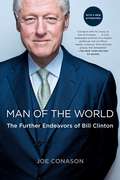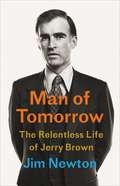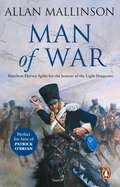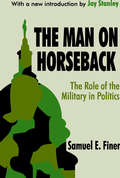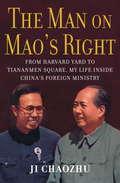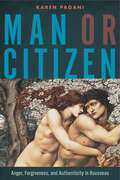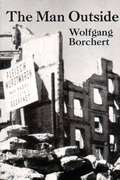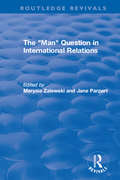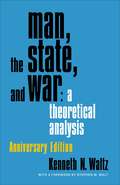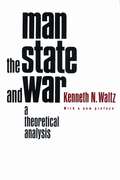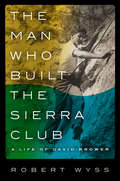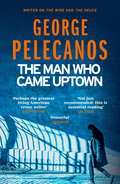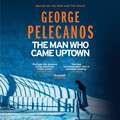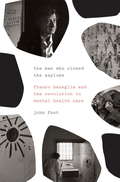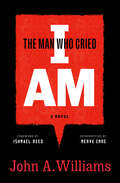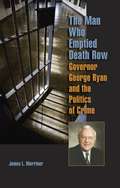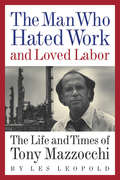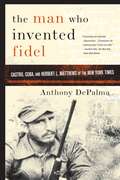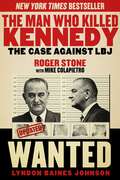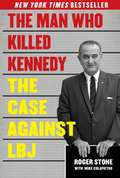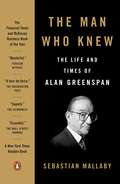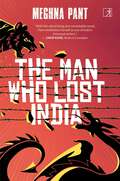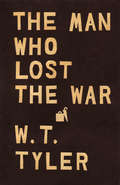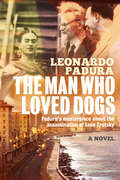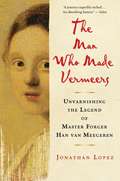- Table View
- List View
Man of the World: The Further Endeavors of Bill Clinton
by Joe Conason"Engrossing...detailed and intimate." --Publishers Weekly "Absorbing" --Kirkus Reviews Veteran political journalist Joe Conason brings you along with Bill Clinton, as the forty-second president blazes new paths in his post-presidential career.It is unlike the second career of any other president: "Bill Clinton" is a global brand, rising from the dark days of his White House departure to become one of the most popular names in the world. Conason describes how that happened, examining Clinton's achievements, his failures, his motivations, and his civilian life. He explains why Clinton's ambitions for the world continue to inspire (and infuriate). Conason, who has covered Clinton for twenty years, interviewed him many times for this book--as well as Hillary and Chelsea and many of his friends, aides, rivals, and supporters. He has travelled with Clinton to Africa, Haiti, Israel, and across America. Clinton has earned tens of millions of dollars and raised billions for philanthropy, much of it from foreign sources, provoking questions about transparency and probity even as Hillary Clinton runs again for the presidency. Conason closely examines the financial support from other countries, corporations, and wealthy individuals, while assessing the Clinton Foundation's very real, far reaching achievements. He observes Clinton campaigning for his wife and asks: How would America's very first First Gentleman fare in a Hillary Clinton White House? Man of the World--starring the one and only Bill Clinton--tells the engrossing story of an extraordinary man who is still seeking to do good in the world.
Man of Tomorrow: The Relentless Life of Jerry Brown
by Jim NewtonVisionary. Iconoclast. Political Survivor. "A powerful and entertaining look" (Governor Gavin Newsom) at the extraordinary life and political career of Governor Jerry Brown.Jerry Brown is no ordinary politician. Like his state, he is eclectic, brilliant, unpredictable and sometimes weird. And, as with so much that California invents and exports, Brown's life story reveals a great deal about this country. With the exclusive cooperation of Governor Brown himself, Jim Newton has written the definitive account of Jerry Brown's life. The son of Pat Brown, who served as governor of California through the 1960s, Jerry would extend and also radically alter the legacy of his father through his own service in the governor's mansion. As governor, first in the 1970s and then again, 28 years later in his remarkable return to power, Jerry Brown would propound an alternative menu of American values: the restoration of the California economy while balancing the state budget, leadership in the international campaign to combat climate change and the aggressive defense of California's immigrants, no matter by which route they arrived. It was a blend of compassion, far-sightedness and pragmatism that the nation would be wise to consider. The story of Jerry Brown's life is in many ways the story of California and how it became the largest economy in the United States. Man of Tomorrow traces the blueprint of Jerry Brown's off beat risk-taking: equal parts fiscal conservatism and social progressivism. Jim Newton also reveals another side of Jerry Brown, the once-promising presidential candidate whose defeat on the national stage did nothing to diminish the scale of his political, intellectual and spiritual ambitions. To the same degree that California represents the future of America, Jim Newton's account of Jerry Brown's life offers a new way of understanding how politics works today and how it could work in the future.
Man Of War: (The Matthew Hervey Adventures: 9): A thrilling and action-packed military adventure from bestselling author Allan Mallinson that will make you feel you are in the midst of the battle (Matthew Hervey #9)
by Allan MallinsonPerfect for fans of Patrick O'Brian, Bernard Cornwell and CS Forester, another engrossing Matthew Hervey adventure from the pen of THE SUNDAY TIMES BESTSELLING AUTHOR Allan Mallinson. "Hervey's thrilling battles against the vivid backdrop of the developing British Empire make for richly engaging storytelling" -- DAILY MAIL"Captain Matthew Hervey is as splendid a hero as ever sprang from an author's pen" -- THE TIMES"The heir to Patrick O'Brian and C. S. Forester" -- OBSERVER"Absolutely brilliant" -- ***** Reader review"An absolute delight" -- ***** Reader review ***********************************************************1827: Britain and the MediterraneanCaptain Sir Laughton Peto, recently engaged to Matthew Hervey's sister, is sailing his mighty line-of-battle ship towards Navarino Bay, and war with the Turks.Six months on, and Matthew Hervey is in London recovering from another bout of malaria and the wound from his battle with the Zulu. All is set for his marriage to the eminently suitable Lady Lankester, and his return to active duty at the Cape. But trouble lies ahead as familial commitments clash with affairs of the heart and Hervey finds himself embroiled in a military inquiry that could result in public humiliation. As the cataclysmic battle of Navarino Bay looms ever closer for Peto and his crew, Hervey faces a crisis that could change both his life and his military career...Man of War is the ninth book in Allan Mallinson's Matthew Hervey series. His adventures continue in Warrior. Have you read his previous adventures A Close Run Thing, The Nizam's Daughters, A Regimental Affair, A Call to Arms, The Sabre's Edge, Rumours of War, An Act of Courage and A Company of Spears?
The Man on Horseback: The Role of the Military in Politics
by Samuel FinerThe role of the military in a society raises a number of issues: How much separation should there be between a civil government and its army? Should the military be totally subordinate to the polity? Or should the armed forces be allowed autonomy in order to provide national security? Recently, the dangers of military dictatorships-as have existed in countries like Panama, Chile, and Argentina-have become evident. However, developing countries often lack the administrative ability and societal unity to keep the state functioning in an orderly and economically feasible manner without military intervention.Societies, of course, have dealt with the realities of these problems throughout their histories, and the action they have taken at any particular point in time has depended on numerous factors. In the ""first world"" of democratic countries, the civil-military relationship has been thoroughly integrated, and indeed by most modern standards this is seen as essential. However, several influential Western thinkers have developed theories arguing for the separation of the military from any political or social role. Samuel Huntington, emphasized that professionalism would presuppose that the military should intervene as little as possible in the political sphere. Samuel E. Finer, in contrast, emphasizes that a government can be efficient enough way to keep the civil-military relationship in check, ensuring that the need for intervention by the armed forces in society would be minimal. At the time of the book's original publication, perhaps as a consequence of a post-World War II Cold War atmosphere, this was by no means a universally accepted position. Some considered the military to be a legitimate threat to a free society. Today's post-Cold War environment is an appropriate time to reconsider Finer's classic argument.The Man on Horseback continues to be an important contribution to the study of the military's role in the realm of politics, and will be of interest to stu
The Man on Mao's Right
by Ji ChaozhuNo other narrative from within the corridors of power has offered as frank and intimate an account of the making of the modern Chinese nation as Ji Chaozhu’sThe Man on Mao’s Right. Having served Chairman Mao Zedong and the Communist leadership for two decades, and having become a key figure in China’s foreign policy, Ji now provides an honest, detailed account of the personalities and events that shaped today’s People’s Republic. The youngest son of a prosperous government official, nine-year-old Ji and his family fled Japanese invaders in the late 1930s, escaping to America. Warmly received by his new country, Ji returned its embrace as he came of age in New York’s East Village and then attended Harvard University. But in 1950, after years of enjoying a life of relative ease while his countrymen suffered through war and civil strife, Ji felt driven by patriotism to volunteer to serve China in its conflict with his adoptive country in the Korean War. Ji’s mastery of the English language and American culture launched his improbable career, eventually winning him the role of English interpreter for China’s two top leaders: Premier Zhou Enlai and Party Chairman Mao Zedong. With a unique blend of Chinese insight and American candor, Ji paints insightful portraits of the architects of modern China: the urbane, practical, and avuncular Zhou, the conscience of the People’s Republic; and the messianic, charismatic Mao, student of China’s ancient past–his country’s stern father figure. In Ji’s memoir, he is an eyewitness to modern Chinese history, including the Great Leap Forward, the Cultural Revolution, the Nixon summit, and numerous momentous events in Tiananmen Square. As he becomes caught up in political squabbles among radical factions, Ji’s past and charges against him of “incorrect” thinking subject him to scrutiny and suspicion. He is repeatedly sent to a collective farm to be “reeducated” by the peasants. After the Mao years, Ji moves on to hold top diplomatic posts in the United States and the United Kingdom and then serves as under secretary-general of the United Nations. Today, he says, “The Chinese know America better than the Americans know China. The risk is that we misperceive each other. ” This highly accessible insider’s chronicle of a struggling people within a developing powerhouse nation is also Ji Chaozhu’s dramatic personal story, certain to fascinate and enlighten Western readers. A riveting biography and unique historical record,The Man on Mao’s Rightrecounts the heartfelt struggle of a man who loved two powerful nations that were at odds with each other. Ji Chaozhu played an important role in paving the way for what is destined to be known as the Chinese Century. Praise forThe Man on Mao’s Right "Brave, beautifully written testimony . A true "fly-on-the-wall" account of the momentous changes in Chinese society and international relations over the last century. " --Kirkus Reviews “It is a relief to read an account by an urbane and often witty insider who neither idolizes nor demonizes China's top leaders . . . . Highly recommended. "—Library Journal, starred review
Man or Citizen: Anger, Forgiveness, and Authenticity in Rousseau (G - Reference, Information and Interdisciplinary Subjects)
by Karen PaganiThe French studies scholar Patrick Coleman made the important observation that over the course of the eighteenth century, the social meanings of anger became increasingly democratized. The work of Jean-Jacques Rousseau is an outstanding example of this change. In Man or Citizen, Karen Pagani expands, in original and fascinating ways, the study of anger in Rousseau’s autobiographical, literary, and philosophical works. Pagani is especially interested in how and to what degree anger—and various reconciliatory responses to anger, such as forgiveness—functions as a defining aspect of one’s identity, both as a private individual and as a public citizen. Rousseau himself was, as Pagani puts it, “unabashed” in his own anger and indignation—toward society on one hand (corrupter of our naturally good and authentic selves) and, on the other, toward certain individuals who had somehow wronged him (his famous philosophical disputes with Voltaire and Diderot, for example). In Rousseau’s work, Pagani finds that the extent to which an individual processes, expresses, and eventually resolves or satisfies anger is very much of moral and political concern. She argues that for Rousseau, anger is not only inevitable but also indispensable, and that the incapacity to experience it renders one amoral, while the ability to experience it is a key element of good citizenship.
The Man Outside
by Wolfgang Borchert David PorterBochert speaks about WWII, its victims and repercussions.
The "Man" Question in International Relations: Sex, Gender And Violence In International Relations (Routledge Revivals)
by Marysia Zalewski Jane ParpartOriginally published in 1998, The "Man" Question in International Relations looks the prevalence of man in the world of international relations. The book argues that, focusing on women as a way of changing the gender of international relations can position women as "the problem." The authors of this book suggest that the problem is not "woman" but "man." Rather than highlighting the absences and presence of women in the theories and practices of international relations, the authors concentrate on questioning the practices of masculinities, the hegemony of men, and the subject of "man." In this way, they hope to destabilize the field in ways that "adding women and stirring" has not.
Man, the State, and War: A Theoretical Analysis
by Kenneth WaltzWhat are the causes of war? How might the world be made more peaceful? In this landmark work of international relations theory, first published in 1959, the eminent realist scholar Kenneth N. Waltz offers a foundational analysis of the nature of conflict between states. He explores works by both classic political philosophers, such as St. Augustine, Hobbes, Kant, and Rousseau, and modern psychologists and anthropologists to discover ideas intended to explain war among states and related prescriptions for peace. Waltz influentially distinguishes among three “images” of the origins of war: those that blame individual leaders or human nature, those rooted in states’ internal composition, and those concerning the structure of the international system. With a foreword by Stephen M. Walt on the legacy and continued relevance of Waltz’s work, this anniversary edition brings new life to a perennial international relations classic.
Man, the State, and War: A Theoretical Analysis
by Kenneth WaltzWhat are the causes of war? To answer this question, Professor Waltz examines the ideas of major thinkers throughout the history of Western civilization. He explores works both by classic political philosophers, such as St. Augustine, Hobbes, Kant, and Rousseau, and by modern psychologists and anthropologists to discover ideas intended to explain war among states and related prescriptions for peace.
The Man Who Built the Sierra Club: A Life of David Brower
by Robert WyssDavid Brower (1912–2000) was a central figure in the modern environmental movement. His leadership, vision, and elegant conception of the wilderness forever changed how we approach nature. In many ways, he was a twentieth-century Thoreau. Brower transformed the Sierra Club into a national force that challenged and stopped federally sponsored projects that would have dammed the Grand Canyon and destroyed hundreds of millions of acres of our nation's wilderness. To admirers, he was tireless, passionate, visionary, and unyielding. To opponents and even some supporters, he was contentious and polarizing.As a young man growing up in Berkeley, California, Brower proved himself a fearless climber of the Sierra Nevada's dangerous peaks. After serving in the Tenth Mountain Division during World War II, he became executive director of the Sierra Club. This uncompromising biography explores Brower's role as steward of the modern environmental movement. His passionate advocacy destroyed lifelong friendships and, at times, threatened his goals. Yet his achievements remain some of the most important triumphs of the conservation movement. What emerges from this unique portrait is a rich and robust profile of a leader who took up the work of John Muir and, along with Rachel Carson, made environmentalism the cause of our time.
The Man Who Came Uptown: One of The Times ‘Best Crime Novels of the Decade’
by George PelecanosFrom writer and producer on HBO's THE WIRE and THE DEUCE comes one of the most critically-acclaimed crime novels of the year:'He is, quite simply, among America's finest crime writers. This latest story does not disappoint ... lyrical, beautifully observed and constantly surprising, it is a delight' Daily Mail'In his first novel for five years, Pelecanos demonstrates why he deserves to be regarded as one of the best American crime novelists ... It's a moving tale, beautifully told' The Times* * * * *Anna Byrne is a jailhouse librarian. In a place where hope is hard to find, the power of books can be a light in the dark. For some of the prisoners, her work is life-changing.Like Michael Hudson, her best student, who's been locked up awaiting trial before his sudden release. He's relieved to be free - to 'come uptown', as they say - but can't shake the question: why is the witness who put him behind bars is suddenly refusing to testify? There's a man who might have the answer, but he wants something first. Phil Ornazian is a private investigator who moonlights as a petty criminal. He's not exactly proud of it, but times are hard in Washington, D.C. People have to change to survive, or die trying.But everything comes at a price and, at some point, everyone has to pay...* * * * *Praise for George Pelecanos: 'Perhaps the greatest living American crime writer' Stephen King 'Outstanding' Sunday Telegraph 'Powerful' Observer'American crime writing at its finest' Independent on Sunday'Terrific' Elmore Leonard 'Powerful' Michael Connelly 'I love the way he writes: economical, rhythmic, elliptical and angrily political' Val McDermid'Hard-boiled fiction with heart' Sunday Telegraph'Pelecanos has joined James Lee Burke and Lawrence Block at the high table of contemporary crime greats' The Times'The coolest writer in America' GQ 'Gold-standard character-driven crime writing that few will ever match' Financial Times
The Man Who Came Uptown: One of The Times ‘Best Crime Novels of the Decade'
by George PelecanosAnna Byrne is a jailhouse librarian. Most days, she loves her job and shares the life-affirming power of books to people who would have no hope without them. Often, she can get too close and forget some of these men are dangerous criminals.But some of them never had a chance. Like Michael Hudson, who's been locked up awaiting trial before his sudden release. He's happy and relieved but can't shake the question preying on his mind: how comes the witness who put him behind bars is suddenly refusing to testify?There's a man who might have the answer, but he wants something first. Phil Ornazian is a private investigator who moonlights as a petty criminal. He's not exactly proud of it, but times are hard in Washington D.C. People have to change to survive, or die trying.But everything comes at a price and, at some point, everyone has to pay...
The Man Who Closed the Asylums: Franco Basaglia and the Revolution in Mental Health Care
by John FootWhen the wind of the 1960s blew through the world of psychiatry In 1961, when Franco Basaglia arrived outside the grim walls of the Gorizia asylum, on the Italian border with Yugoslavia, it was a place of horror, a Bedlam for the mentally sick and excluded, redolent of Basaglia's own wartime experience inside a fascist gaol. Patients were frequently restrained for long periods, and therapy was largely a matter of electric and insulin shocks. The corridors stank, and for many of the interned the doors were locked for life. This was a concentration camp, not a hospital.Basaglia, the new Director, was expected to practise all the skills of oppression in which he had been schooled, but he would have none of this. The place had to be closed down by opening it up from the inside, bringing freedom and democracy to the patients, the nurses and the psychiatrists working in that "total institution."Inspired by the writings of authors such as Primo Levi, R.D. Laing, Erving Goffman, Michel Foucault and Frantz Fanon, and the practices of experimental therapeutic communities in the UK, Basaglia's seminal work as a psychiatrist and campaigner in Gorizia, Parma and Trieste fed into and substantially contributed to the national and international movement of 1968. In 1978 a law was passed (the "Basaglia law") which sanctioned the closure of the entire Italian asylum system.The first comprehensive study of this revolutionary approach to mental health care, The Man Who Closed the Asylums is a gripping account of one of the most influential movements in twentieth-century psychiatry, which helped to transform the way we see mental illness. Basaglia's work saved countless people from a miserable existence, and his legacy persists, as an object lesson in the struggle against the brutality and ignorance that the establishment peddles to the public as common sense.From the Hardcover edition.
The Man Who Cried I Am: A Novel
by John A. WilliamsRediscover the sensational 1967 literary thriller that captures the bitter struggles of postwar Black intellectuals and artistsWith a foreword by Ishmael Reed and a new introduction by Merve Emre about how this explosive novel laid bare America's racial fault linesMax Reddick, a novelist, journalist, and presidential speechwriter, has spent his career struggling against the riptide of race in America. Now terminally ill, he has nothing left to lose. An expat for many years, Max returns to Europe one last time to settle an old debt with his estranged Dutch wife, Margrit, and to attend the Paris funeral of his friend, rival, and mentor Harry Ames, a character loosely modelled on Richard Wright.In Amsterdam, among Harry&’s papers, Max uncovers explosive secret government documents outlining &“King Alfred,&” a plan to be implemented in the event of widespread racial unrest and aiming &“to terminate, once and for all, the Minority threat to the whole of the American society.&” Realizing that Harry has been assassinated, Max must risk everything to get the documents to the one man who can help.Greeted as a masterpiece when it was published in 1967, The Man Who Cried I Am stakes out a range of experience rarely seen in American fiction: from the life of a Black GI to the ferment of postcolonial Africa to an insider&’s view of Washington politics in the era of segregation and the Civil Rights Movement, including fictionalized portraits of Martin Luther King, Jr., and Malcolm X. John A. Williams and his lost classic are overdue for rediscovery.Few novels have so deliberately blurred the boundaries between fiction and reality as The Man Who Cried I Am (1967), and many of its early readers assumed the King Alfred plan was real. In her introduction, Merve Emre examines the gonzo marketing plan behind the novel that fueled this confusion and prompted an FBI investigation. This deluxe paperback also includes a new foreword by novelist Ishmael Reed.&“It is a blockbuster, a hydrogen bomb . . . . This is a book white people are not ready to read yet, neither are most black people who read. But [it] is the milestone produced since Native Son. Besides which, and where I should begin, it is a damn beautifully written book.&” —Chester Himes&“Magnificent . . . obviously in the Baldwin and Ellison class.&” —John Fowles&“If The Man Who Cried I Am were a painting it would be done by Brueghel or Bosch. The madness and the dance is never-ending display of humanity trying to creep past inevitable Fate.&” —Walter Mosely
The Man Who Emptied Death Row: Governor George Ryan and the Politics of Crime
by James L. MerrinerGeorge H. Ryan, Illinois governor from 1999 to 2003, became nationally known for two significant and very different reasons. The first governor in the United States to clear out his state's death row and put a moratorium on the death penalty, he was also convicted and sent to prison on corruption charges. The Man Who Emptied Death Row: Governor George Ryan and the Politics of Crime details the career of a man who both enhanced and tarnished the image of the highest office in Illinois and examines the political history and culture that shaped him. Author James L. Merriner explores the two very different stories of George Ryan: the brave crusader against the death penalty and the petty crook. An extensive analysis of the official record, exclusive interviews, and previously undisclosed incidents in Ryan's career expose why the governor pardoned or commuted the sentences of all 171 prisoners on Illinois's death row before leaving office and how he later was convicted of eighteen counts of official corruption. This biography traces Ryan's family history and the Illinois political climate that influenced his development as a politician. Although Ryan championed "good-government" initiatives--organ donations, tougher drunken-driving and lobbyist disclosure laws--he never overcame a reputation as a wheeler-dealer, notes Merriner. Merriner goes beyond Ryan's life and career to explore the politics of crime, highlighting the successes and failures of the criminal justice system and suggesting how both white-collar fraud and violent crime shape politics. A fascinating story that reveals much about the way Illinois politics works, The Man Who Emptied Death Row will help determine how history will judge Illinois governor George Ryan.
The Man Who Hated Work and Loved Labor
by Les LeopoldIn this paramount biography of the late Tony Mazzocchi, author and labor expert Leopold recounts the life of the former Oil, Chemical, and Atomic Workers Union leader and his struggle to address the disgraceful toxic exposure of tens of thousands of workers.
The Man Who Invented Fidel
by Anthony DepalmaIn 1957, Herbert L. Matthews of the New York Times, then considered one of the premiere foreign correspondents of his time, tracked down Fidel Castro in Cuba's Sierra Maestra mountains and returned with what was considered the scoop of the century. His heroic portrayal of Castro, who was then believed dead, had a powerful effect on American perceptions of Cuba, both in and out of the government, and profoundly influenced the fall of the Batista regime. When Castro emerged as a Soviet-backed dictator, Matthews became a scapegoat; his paper turned on him, his career foundered, and he was accused of betraying his country. In this fascinating book, New York Times reporter DePalma investigates the Matthews case to reveal how it contains the story not just of one newspaperman but of an age, not just how Castro came to power but how America determines who its enemies are. He re-creates the atmosphere of revolutionary Cuba and Cold War America, and clarifies the facts of Castro's ascension and political evolution from the many myths that have sprung up around them. Through a dramatic, ironic, in ways tragic story, The Man Who Invented Fidel offers provocative insights into Cuban politics, the Cuban-American relationship, and the many difficult balancing acts of responsible journalism.
The Man Who Killed Kennedy: The Case Against LBJ
by Mike Colapietro Roger Stone"We appreciate Roger Stone, he is one tough cookie." - President TrumpThe sensational New York Times bestseller, now in paperback.Find out how and why LBJ had JFK assassinated.The Man Who Killed Kennedy: The Case Against LBJ hit the New York Times bestseller list the week of the 50th Anniversary of the assassination of President John F. Kennedy. Consummate political insider Roger Stone makes a compelling case that Lyndon Baines Johnson had the motive, means, and opportunity to orchestrate the murder of JFK. Stone maps out the case that LBJ blackmailed his way on the ticket in 1960 and was being dumped in 1964 to face prosecution for corruption at the hands of his nemesis attorney Robert Kennedy. Stone uses fingerprint evidence and testimony to prove JFK was shot by a long-time LBJ hit man-not Lee Harvey Oswald.President Johnson would use power from his personal connections in Texas, from the criminal underworld, and from the United States government to escape an untimely end in politics and to seize even greater power. President Johnson, the thirty-sixth president of the United States, was the driving force behind a conspiracy to murder President Kennedy on November 22, 1963.In The Man Who Killed Kennedy, you will find out how and why he did it.Legendary political operative and strategist Roger Stone has gathered documents and uses his firsthand knowledge to construct the ultimate tome to prove that LBJ was not only involved in JFK’s assassination, but was in fact the mastermind.Skyhorse Publishing, as well as our Arcade imprint, are proud to publish a broad range of books for readers interested in history--books about World War II, the Third Reich, Hitler and his henchmen, the JFK assassination, conspiracies, the American Civil War, the American Revolution, gladiators, Vikings, ancient Rome, medieval times, the old West, and much more. While not every title we publish becomes a national bestseller, we are committed to books on subjects that are sometimes overlooked and to authors whose work might not otherwise find a home.
The Man Who Killed Kennedy
by Mike Colapietro Roger StoneLyndon Baines Johnson was a man of great ambition and enormous greed, both of which, in 1963, would threaten to destroy him. In the end, President Johnson would use power from his personal connections in Texas and from the underworld and from the government to escape an untimely end in politics and to seize even greater power. President Johnson, the thirty-sixth president of the United States, was the driving force behind a conspiracy to murder President John F. Kennedy on November 22, 1963.In The Man Who Killed Kennedy, you will find out how and why he did it.Political consultant, strategist, and Libertarian Roger Stone has gathered documents and used his firsthand knowledge to construct the ultimate tome to prove that LBJ was not only involved in JFK's assassination, but was in fact the mastermind.With 2013 being the fiftieth anniversary of JFK's assassination, this is the perfect time for The Man Who Killed Kennedy to be available to readers. The research and information in this book is unprecedented, and as Roger Stone lived through it, he's the perfect person to bring it to everyone's attention.
The Man Who Knew: The Life and Times of Alan Greenspan
by Sebastian MallabyThe definitive biography of the most important economic statesman of our time Sebastian Mallaby's magisterial biography of Alan Greenspan, the product of over five years of research based on untrammeled access to his subject and his closest professional and personal intimates, brings into vivid focus the mysterious point where the government and the economy meet. To understand Greenspan's story is to see the economic and political landscape of the last 30 years--and the presidency from Reagan to George W. Bush--in a whole new light. As the most influential economic statesman of his age, Greenspan spent a lifetime grappling with a momentous shift: the transformation of finance from the fixed and regulated system of the post-war era to the free-for-all of the past quarter century. The story of Greenspan is also the story of the making of modern finance, for good and for ill. Greenspan's life is a quintessential American success story: raised by a single mother in the Jewish émigré community of Washington Heights, he was a math prodigy who found a niche as a stats-crunching consultant. A master at explaining the economic weather to captains of industry, he translated that skill into advising Richard Nixon in his 1968 campaign. This led to a perch on the White House Council of Economic Advisers, and then to a dazzling array of business and government roles, from which the path to the Fed was relatively clear. A fire-breathing libertarian and disciple of Ayn Rand in his youth who once called the Fed's creation a historic mistake, Mallaby shows how Greenspan reinvented himself as a pragmatist once in power. In his analysis, and in his core mission of keeping inflation in check, he was a maestro indeed, and hailed as such. At his retirement in 2006, he was lauded as the age's necessary man, the veritable God in the machine, the global economy's avatar. His memoirs sold for record sums to publishers around the world. But then came 2008. Mallaby's story lands with both feet on the great crash which did so much to damage Alan Greenspan's reputation. Mallaby argues that the conventional wisdom is off base: Greenspan wasn't a naïve ideologue who believed greater regulation was unnecessary. He had pressed for greater regulation of some key areas of finance over the years, and had gotten nowhere. To argue that he didn't know the risks in irrational markets is to miss the point. He knew more than almost anyone; the question is why he didn't act, and whether anyone else could or would have. A close reading of Greenspan's life provides fascinating answers to these questions, answers whose lessons we would do well to heed. Because perhaps Mallaby's greatest lesson is that economic statesmanship, like political statesmanship, is the art of the possible. The Man Who Knew is a searching reckoning with what exactly comprised the art, and the possible, in the career of Alan Greenspan.From the Hardcover edition.
The Man Who Lost India
by Meghna PantThe year is 2032. China declares war on India. Pillage and plunder ensues. The war comes to an abrupt halt when a supernatural event saves the obscure town of Lalbag from annihilation. Even as China renews its efforts to invade Lalbag, a greater calamity awaits this sleepy town. A Chinese cop stumbles upon a dangerous secret that threatens to end the town&’s immunity. A fierce and forbidden love between a servant and his mistress destroys two families. Meanwhile, the town&’s richest man becomes afflicted with a terrible disease, the town beauty goes mad when her love betrays, and a psychic turns water into blood, sending the town and its people deeper into tragedy. A dystopian never-been-done-before tale set in – and between – China and India, The Man Who Lost India is a powerful portrayal of love, strife and family in the wake of 21st century&’s biggest war. Incantatory and atmospheric, this is Meghna Pant&’s most ambitious novel yet, full of beauty, bloodshed and undeniable feminist power.
The Man Who Lost the War
by W. T. TylerSet in post-war Berlin, a disillusioned former CIA operative and a Russian spy cross paths in their search for an elusive double agent.
The Man Who Loved Dogs
by Anna Kushner Leonardo PaduraThe story of Ramon Mercader, the assassin of Trotsky. Moving seamlessly between Cuba where Mercader lived out the last years of his life, Mercader's early years in Spain and France, and Trotsky's long years of exile, it is the story of revolutions fought and betrayed, the ways in which men's which men's political convictions are continually tested and manipulated.
The Man Who Made Vermeers: Unvarnishing The Legend Of Master Forger Han Van Meegeren
by Jonathan LopezIt's a story that made Dutch painter Han van Meegeren famous worldwide when it broke at the end of World War II: A lifetime of disappointment drove him to forge Vermeers, one of which he sold to Hermann Goering in mockery of the Nazis. And it's a story that's been believed ever since. Too bad it isn't true. Jonathan Lopez has drawn on never-before-seen documents from dozens of archives to write a revelatory new biography of the world's most famous forger. Neither unappreciated artist nor antifascist hero, Van Meegeren emerges as an ingenious, dyed-in-the-wool crook-a talented Mr. Ripley armed with a paintbrush. Lopez explores a network of illicit commerce that operated across Europe: Not only was Van Meegeren a key player in that high-stakes game in the 1920s and '30s, landing fakes with famous collectors such as Andrew Mellon, but he and his associates later cashed in on the Nazi occupation. The Man Who Made Vermeers is a long-overdue unvarnishing of Van Meegeren's legend and a deliciously detailed story of deceit in the art world.
